When Food Meets Tech: 12 Cool Ideas With Good Taste
At a Brooklyn expo, innovators brought out their latest ideas for making what we eat more sustainable, nutritious and delicious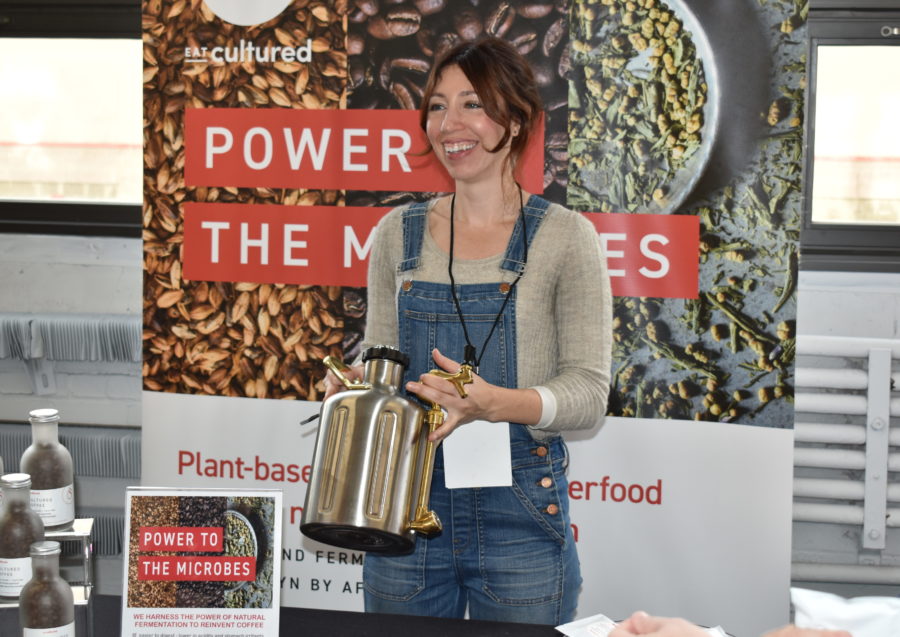
A representative of Cultured Coffee, which sells fermented beans, with a dispenser for serving cold brew (Photos by Steve Koepp)
Beer made from bread, and milk made from oats. A pocket-size gluten detector. Fermented coffee beans. Oysters delivered to your door. All of these innovations and dozens of others were on display last weekend at the Food Loves Tech conference, an expo devoted to the future of food and drink. Startups were abundant. The event, hosted by Edible Manhattan and Edible Brooklyn at Industry City in Sunset Park, offered wild variety but consistent themes of sustainability and good health. As the hosts put it, “At best, this data-flooded food culture will mean more traceability, less waste, increased crop diversity, less overeating. Hopefully.” We strolled among the exhibits and bring you a few highlights.
1. Beer Made Out of Bread
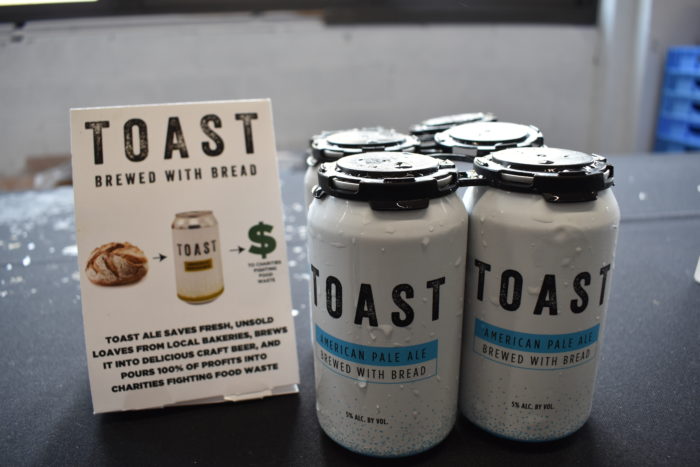
Toast Ale is a company based on the premise that about 44% of bread is wasted, and can be used to make beer. Launched in the United Kingdom and now brewing an American Pale Ale in the Bronx, Toast is made with “unsold loaves from bakeries and unused crusts from sandwich makers,” along with hops, yeast and water, says the company. Toast gives 100% of its profits to Feedback, an environmental charity campaigning to end food waste.
2. A Vegetable Garden in a Package
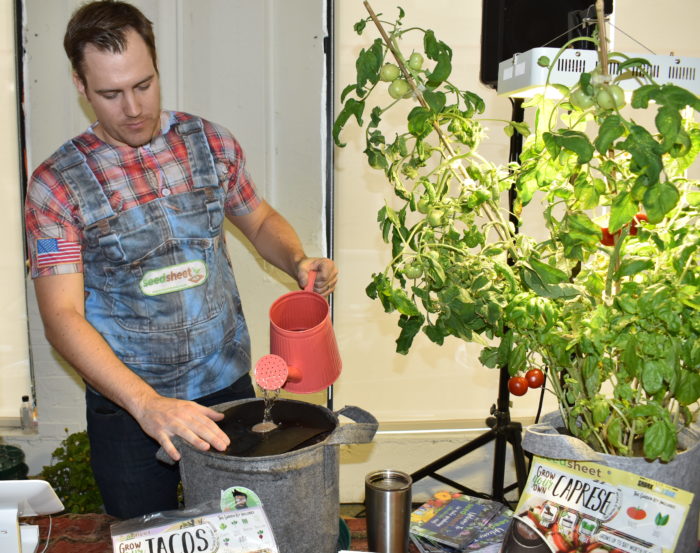
The mission of Seedsheet is “to make it ridiculously easy to grow plants,” says the company. Launched in 2012 by Vermonter Cameron MacKugler, a designer of green roofs and other sustainable projects, the company packages seeds arrayed within sheets to start a container garden or outdoor patch according to categories that include salad greens, herbs and peppers.
3. Have a Food Allergy? Meet Your Guardian Angel
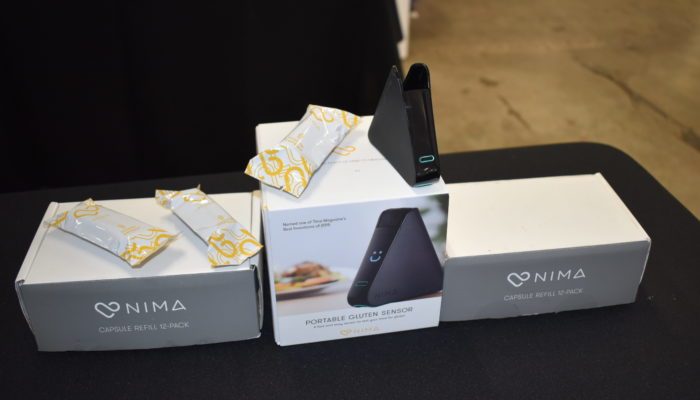
Nima is a portable sensor that can detect gluten in liquid and solid foods in about two minutes, according to its manufacturer. This could be particularly helpful for people with celiac disease when dining in restaurants, for example. Co-founders Shireen Yates and Scott Sundvor, who have food sensitivities themselves, met at MIT in 2013 and won an audience-choice award in a startup competition. Since then, they’ve secured $10 million in venture capital and started shipping devices in 2016. The San Francisco-based company is working on sensors for the detection of peanuts, milk and tree nuts.
4. Superfoods Delivered to Your Door
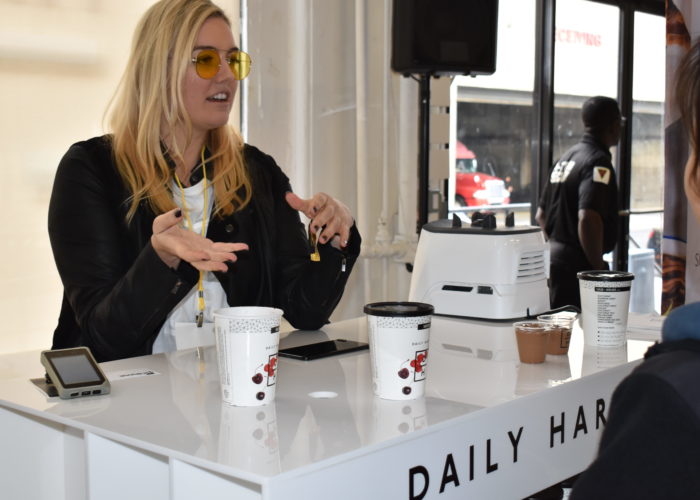
Daily Harvest is kind of a Blue Apron for super-healthy foods, delivered frozen for freshness. Among the offerings are smoothies, sundaes, soups and “activated bowls” with “every whole, organic, unrefined thing you need to power through your day,” the company says. Founded by New Yorker Rachel Drori, the company has Serena Williams and Gwyneth Paltrow on its board.
5. Things Get Better When They're Cultured
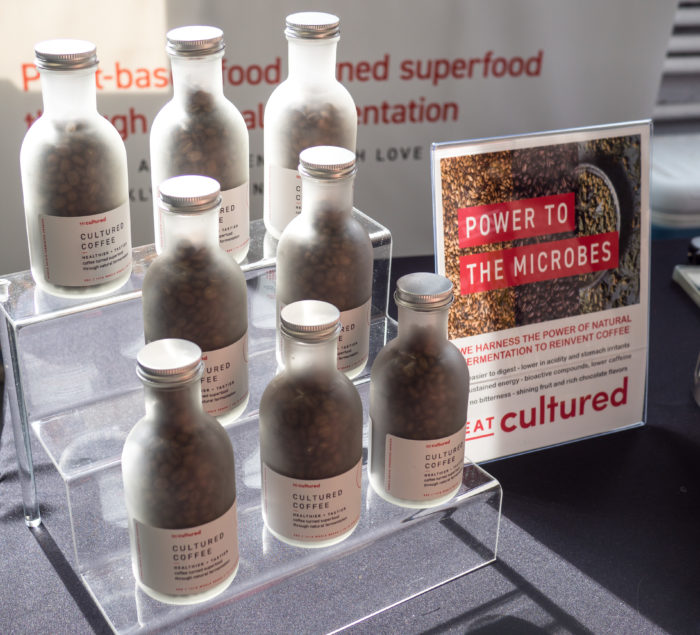
Cultured Coffee is the first product from the startup eatCultured, driven by the idea that controlled fermentation can make foods more nutritious and more digestible. In terms of taste, Cultured Coffee is less bitter than traditional coffee. In terms of active ingredients, the fermentation process converts caffeine in the coffee to a natural bio-stimulant called theophylline, which is found in tea. The result, says the company, is caffeine without the jitters. Afineur, eatCultured’s behind-the-scenes fermentation lab, is a Brooklyn-based biotech company started in 2014 by Camille Delebecque. The startup developed Cultured Coffee and plans other fermented products, including one that would repurpose spent grain from the beer-brewing process.
6. Order Your Oysters Online, Fresh from the Farm
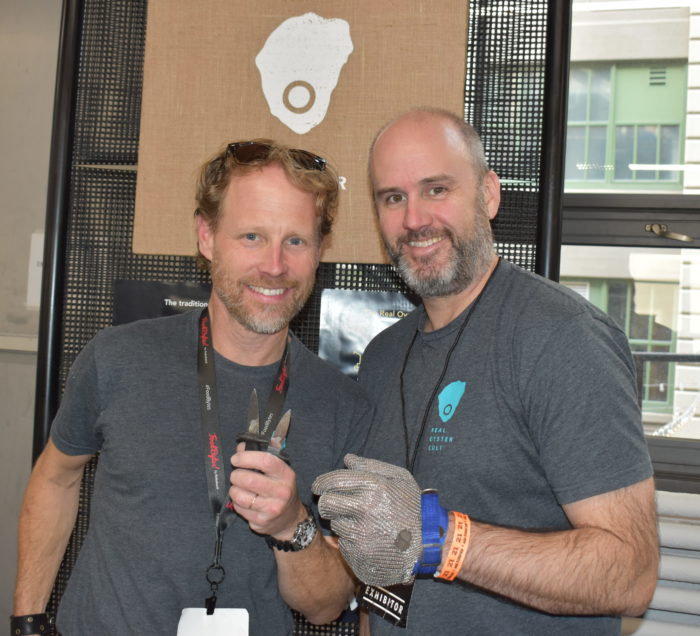
Real Oyster Cult enables oyster lovers to shop online, choosing among varieties from select oyster farms. The oysters are packed to keep them cool and shipped via overnight delivery. The company was founded by Rob Knecht (above left, with colleague Andrew Corbett) and Sims McCormick, who run a family oyster farm in Duxbury, Mass. If you’ve never shucked an oyster yourself, the company is glad to sell you tools and videos to get the hang of it. Real Oyster Cult is big on raising oyster awareness too, noting on its website that oysters are natural ocean cleaners, filtering 25 to 50 gallons a day, and that they contain a lot of antioxidants, vitamins and protein. The company’s Standish Shore variety from Duxbury Bay costs $36 for 20.
7. They Only Do Oats
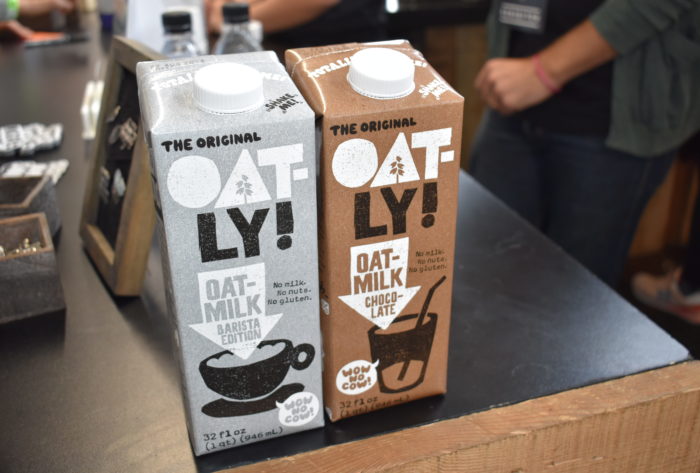
Oatly is a Swedish company that makes milk and other products from oats. This is appealing to customers who want to avoid dairy products for a variety of reasons: they’re vegan, or lactose-intolerant, or they’re sustainability-minded people who know that making milk with cows is environmentally inefficient. The 25-year-old company is now launching its products in the U.S., with oats grown on farms in the U.S. and Canada. Since oats are naturally sweet, the products contain no added sugar.
8. Spicy Pesto from the Rooftop Greenhouse
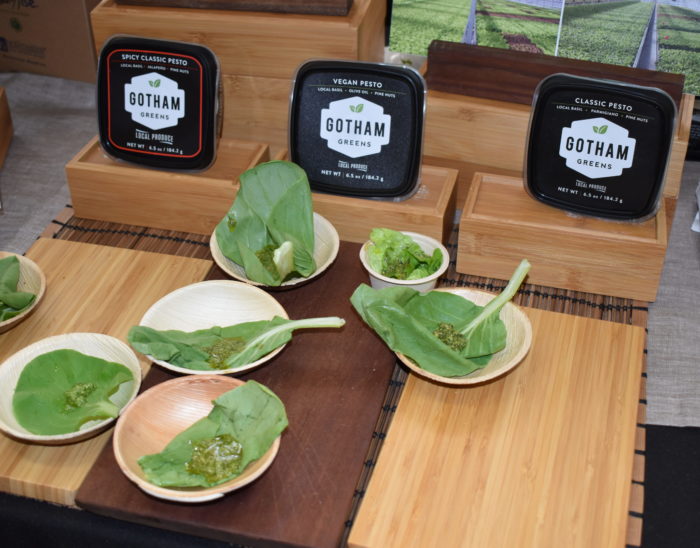
You may already know about Gotham Greens, which are grown in local greenhouses in Brooklyn, Queens and Chicago, and sold all over town. But you might not know that Gotham now sells pesto made from locally grown basil, the newest product being a spicy classic recipe. Gotham’s mission is to grow its vegetables and herbs without pesticides in technologically sophisticated facilities that use 100% clean power. Founded in Brooklyn in 2009 by Viraj Puri and Eric Haley, the company now has 170,000 sq. ft. of growing space.
9. Your Face on a Cookie
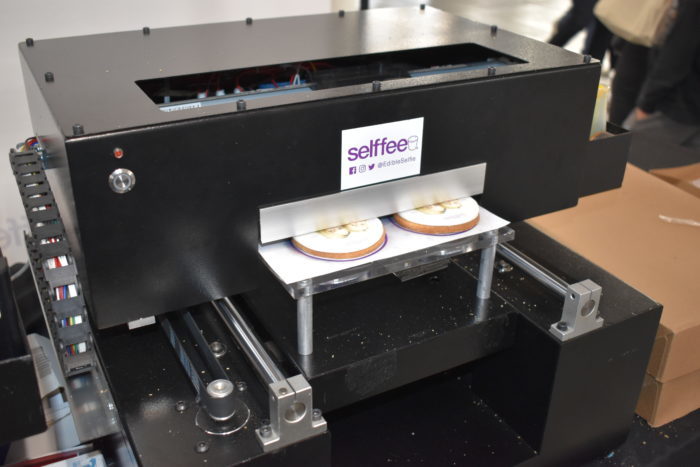
This one’s more for entertainment value: a machine that produces selfies you can eat. Selffee uses edible inks to print images directly on cookies. You can rent the Edible Photo Booth for parties, or send the company an image that it will print on three-inch sugar cookies and deliver to your door. The company got its start on Indiegogo.
10. The Tastier, Healthier Fish
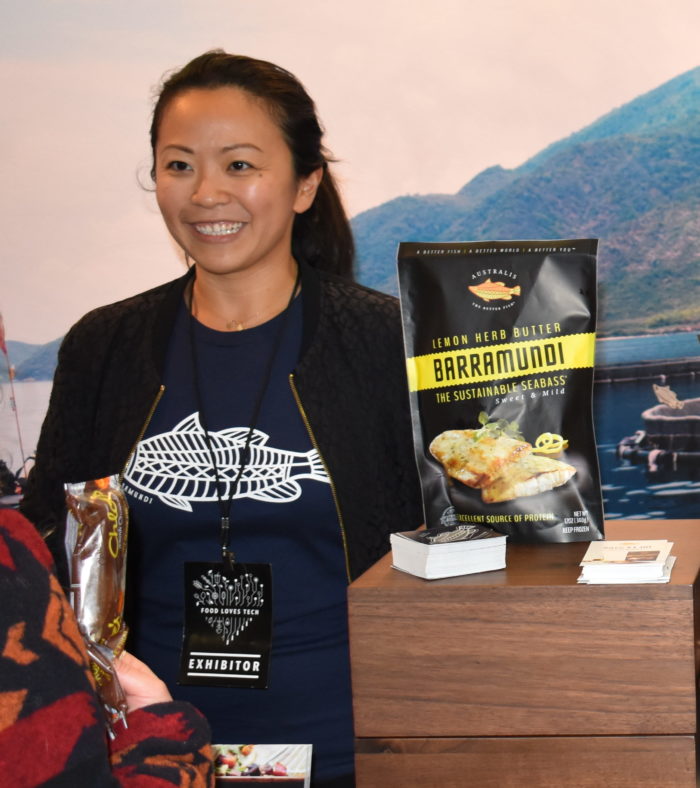
Australis Aquaculture is a Massachusetts-based company that uses sustainable ocean farming to raise barramundi, a type of seabass native to Australia and the Indo-Pacific. The company was founded by Josh Goldman, who developed an aquaponics system in his dorm at Hampshire College. Later he was a pioneer in bringing farm-raised tilapia to the U.S., but later discovered that barramundi is superior in flavor and nutrition. Australis sells its products frozen as well as at fresh-fish counters.
11. Know Where Your Coffee Came From
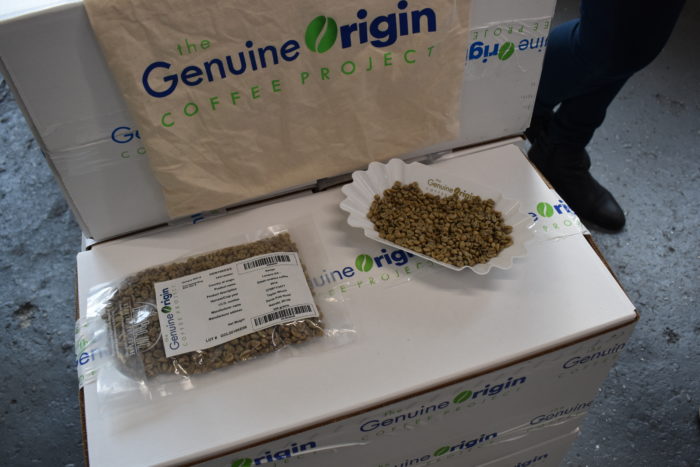
The Genuine Origin Coffee Project was started to connect small coffee-roasting companies with specialty-coffee growers all over the world. Roasters can shop online among green coffees grown from Guatemala to Ethiopia, learning about growing methods, sustainability and soil conditions, and then order shipments in 65-lb. boxes.
12. How to Stop the Waste of 'Ugly' Produce
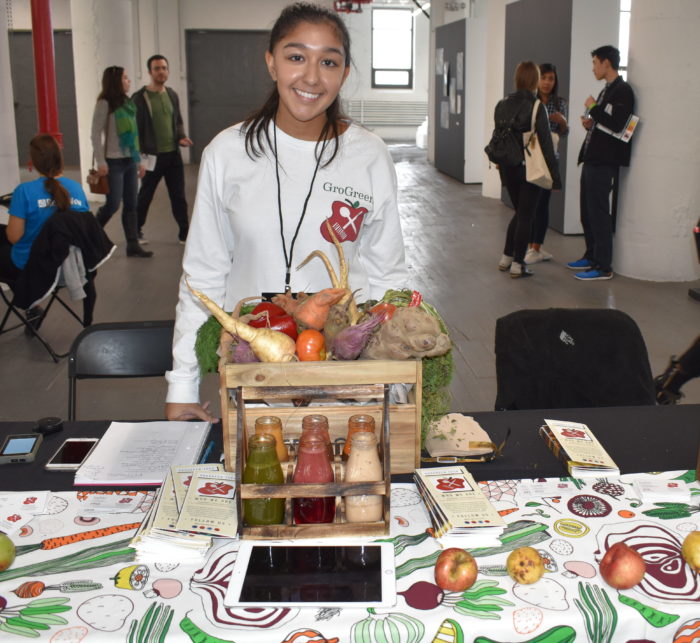
Priya Mittal, founder of GroGreen Tech, is a 17-year-old junior at the Dalton School in Manhattan who got an idea while strolling through a farmers market in Union Square a couple years ago. She noticed that people picked over the produce to find the perfect specimens and shun anything slightly dented. She was shocked to find out how much “ugly” produce is thrown away each year by supermarkets and others: billions of pounds. Her solution is an application, due in 2018, that connects farmers with businesses that can use imperfect produce. Prime examples are restaurants and smoothie bars, “since they transform the produce to the point where the original form no longer matters,” Mittal explains on her website. In April, Mittal’s venture won the Harvard entrepreneurship pitch competition aware for “most environmentally innovative” business idea.










